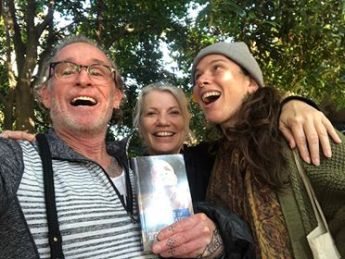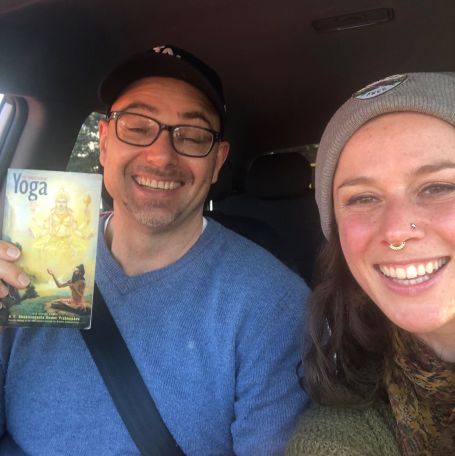in giving we receive
by carlydevi
The Jivamukti Teacher Training (JYTT) program is out of reach for many. It is a long, residential and pricey. At one point three full scholarship spots became available for every JYTT program, a generous and earnest offer. but a surprising pattern emerged. The scholarship recipients, regardless of their sincere intentions, did not go on to become active Jivamukti teachers. In fact a stunning 87% of them did not continue to practice Jivamukti Yoga even just a few years after the training.
This puzzling trend made a few things very obvious. We value what we invest in. Because, our culture is generally fiscally oriented, financial investment increases our sense of risk and responsibility towards our investment. Even though money is simply made of ordinary paper and metal, it is a token of one’s life energy. It is through our hard work that we give our life energy in order to earn money.
When I went to JYTT there was no full scholarship option. I received a partial scholarship and did a grueling work-trade in exchange for room and board At the time I did not know where the teachings would lead me or that the Jivamukti Yoga method would eventually shape each facet of my life. But I knew on some baser level, that it was worth it, and I made it work. Scraping together the money for tuition, and the hours of service for housing, on top of a demanding schedule was a process I will never forget. In sanskrit we call these types of actions, dedicated toward the attainment of Yoga , tapaḥ — austerity, penance or disciplined yogic practice. In Śrimad Bhagavatam tapaḥ is defined as trueness to one’s responsibility.

Science of Self Realization shared with fellow Jivamukti teachers
The interesting thing about our spiritual responsibility (dharma), is that it just comes to us. Often we don’t actively set out on the path, or if we do, it’s not the final destination. In this way, spiritual activities are often performed unknowingly. When something uncommon happens in our progressive spiritual life, this is understood to be incurred by ajñāta-sukṛti, or pious activities beyond one’s knowledge. For me this occured when I met my teachers, so many small (and big) life events had to occur in order to create the situation to be just right for me to meet them, and to be able to receive their teachings. Once meeting the Teacher, the true test is the ability to hear and execute their instructions.
Listen • Hear • Know • Become • Be
The first step of spiritual practice is to listen. It is recommended to listen to and surround yourself in the vibration of the ancient scriptures and the names of the Supreme Person 24/7. If you are surrounded by uplifting teachings and mantra, but not listening, do not fear! There is still some benefit! But we have to deeply listen in order to truly hear and it is from this hearing that we can begin to know. With knowledge, then we begin to make informed choices on our spiritual path, engaging in activities for the benefit of all living beings and eventually we may become who we really are. According to Yogic scripture who we really are is a spark from the divine flame, eternal, full of knowledge and full of bliss. Any act on the spiritual path, purposeful or accidental brings us closer to this essence so we can be who we truly are.
The simple act of giving a donation for spiritual knowledge is one of these unrecognized actions of dharma. In the yogic tradition it is called daksina,which translates to mean charity for opening one’s eyes with knowledge. This form of charity is not mundane, in actuality it is not for the benefit of the teacher. It is for the benefit of the one receiving the wisdom, that they may be purified and able to truly hear the teachings.
I’ve had this debate with friends again and again;
- Shouldn’t yoga classes be free?
- Shouldn’t yoga just be provided for all?!
- Why do I have to pay?
There are the obvious expenses that go in to offering a class (electricity, mortgage, insurance, maintenance, endless continuing education of the teachers, etc.) But even aside separate from this, over the years, I’ve done my fair share of inviting friends (and random acquaintances) to come to class for free. I’ve found, while this approach is heartfelt in its purpose, often the student who attends for free does not value the teachings and inevitably does not commit to the practices. Once a sincere student approached me and said, I am unable to continue paying, but I want to remain your student, IS THERE ANYTHING I CAN DO IN EXCHANGE FOR CLASSES? I offered her a few simple tasks, and she became my most regular student. She came 30 minutes prior to class to take care of her responsibilities and stayed after helping to clear the space. According to the Vedic model of Yoga, daksina offering is a reciprocation and act of gratitude. It is not intended as a simple exchange to provide means for the teacher to support themselves in material life (though this is a subject for another day) the exchange empowers the receiver to better understand the knowledge.
“It is an ancient tradition to give something in return for spiritual knowledge, because by that sacrifice one is connected to the previous teachers who have painstakingly passed this wisdom down to us over the ages.” –Vaisesika Dasa.

Perfection of Yoga goes in to the hands of the sweet Uber driver
I have been very blessed to have so many amazing teachers, and one of the most wonderful things that unifies each of my teachers is that they all credit everything that they have to offer to their teachers. This is a beautiful mood of humility that carries us through the practice of Yoga. Through the grace of my teachers, the greatest teachings have come to me through reading transcendental literature. These books of realized wisdom have revealed to me the Ultimate Dharma, the ultimate aim of Yoga is to Awaken Our Love for the Supreme Person. When we make that connection with the Lord, we can live in harmony with the environment and with each other.
Because the wisdom in thes Yogic books has made such a big impact on my life, part of my practice now is to share these books with others. My first proclivity is to give these books away to everyone I meet! But, similarly to the Yoga classes, I’ve come to realize that we do not value what we do not invest in. Donations are a part of the spiritual process. The exchange actually gives potency to insights gained through our time with authentic teachers and teachings. Investing in spiritual life is the greatest form of divine charity. If you would like to read some text that will help bring you closer to your true nature, truth, eternal wisdom and happiness, please let me know and I’m happy to connect you to a book that will uplift your life.
hope to serve very soon,
carly
Recommended Transcendental Literature:
Jivamukti Yoga: Practices for Liberating Body and Soul Sharon Gannon and David Life
The Journey Home Radhanath Swami
Bhagavad Gita: As It Is A.C. Bhaktivedanta Swami Prabhupada
Gita Wisdom Joshua M. Greene
Dance of Divine Love: India’s Classic Sacred Love Story: The Rasa Lila of Krishna Graham Schweig
Inner Goddess Shyamdas
The Yoga Sutras of Patañjali: A New Edition, Translation, and Commentary Edwin F. Bryant
